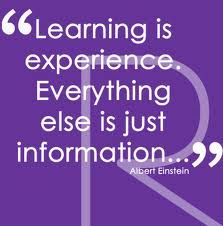PRINCE2 Learn from Experience
 The PRINCE2 Learn from Experience principle makes good sense. Repeat what works, avoid what doesn’t. How difficult can that be? Well hindsight is a wonderful thing – how often does that thought cross your mind? “If only we’d known…”, “I wish we’d spotted that…”, “If only we’d done things differently…” After a project, there should be some kind of post implementation review. That’s great: you explore what you’ve learned from hindsight, so that you can take these lessons through to your next project. But, the question is this: can you benefit from hindsight more immediately? And can you learn lessons now, rather than waiting until the end of the project? All three of the Cabinet Office best practice methods (MoP, MSP and PRINCE2) focus on developing this ‘learn from experience’ throughout the delivery of programs and projects. Our focus in the article is on the PRINCE2 Learn from Experience Principle but the same applies at the Portfolio or Program levels as well.
The PRINCE2 Learn from Experience principle makes good sense. Repeat what works, avoid what doesn’t. How difficult can that be? Well hindsight is a wonderful thing – how often does that thought cross your mind? “If only we’d known…”, “I wish we’d spotted that…”, “If only we’d done things differently…” After a project, there should be some kind of post implementation review. That’s great: you explore what you’ve learned from hindsight, so that you can take these lessons through to your next project. But, the question is this: can you benefit from hindsight more immediately? And can you learn lessons now, rather than waiting until the end of the project? All three of the Cabinet Office best practice methods (MoP, MSP and PRINCE2) focus on developing this ‘learn from experience’ throughout the delivery of programs and projects. Our focus in the article is on the PRINCE2 Learn from Experience Principle but the same applies at the Portfolio or Program levels as well.
Project Reviews
A typical project review is often done “post-mortem” – after the fact, and well past any opportunity to change the outcome. You finish a project, and then you review it to determine what happened. From there, you decide which processes to keep and what you’ll do differently next time. That may help the next project – but it’s too late for the project you’ve just finished. What’s more, if your projects overlap with one-another, you may have already wasted too much time and too many resources in your current project, possibly with harmful effects. Wouldn’t it be better to evaluate along the way – so you can capture lessons learned after each stage, and improve performance immediately? This is where projects of all types, across all industries, could benefit from an ongoing review process and the PRINCE2 Learn from Experience Principle. Best practice in portfolio, program and project management suggests that lessons and knowledge are captured on a regular basis to get the most benefit. The team should have an opportunity to talk about what happened, and other teams can then use this experience right away. This helps the whole organisation improve in a timely manner.
Lessons Identified
Capturing Lessons provides an opportunity to assess what happened and why. There should be learning focused discussions that are designed to help the team and the organisation’s leaders discover what to do differently. Lessons identified can cover a range of items such as:
- What has gone well, what went badly and what was lacking
- Any unusual events that arose which caused problems and how we dealt with them
- Performance of specialist tools and techniques
- How is the program/project management approach working and are there any changes we would like to see in future
- Lessons from Issues which arose
- Planning assumptions and resourcing
We can draw information from our observations and experience during the project together with information from identified risks and issues. An added benefit of this process is that it improves communication and feedback within teams. The focus is on learning instead of blaming, the process leads to improved understanding of team performance, and helps people think about how best to work together to produce better results. On larger projects it may be beneficial to have a meeting at the end of each stage. It is suggested that the meeting:
- Focus on why things happened.
- Compare intended results with what was actually accomplished.
- Encourage participation.
- Emphasize trust and the value of feedback.
Lessons Learned
For the PRINCE2 Learn from Experience Principle to work properly the team needs to discover for itself the lessons provided by the experience. The more open and honest the discussion, the better the result will be. The input of the team should be valued. The discussion needs to be focused. If you ask, “How do you think things went?” this can be too broad a topic to discuss. Instead, direct those involved to think about specific issues or areas: “How well did the team cooperate?” “How could communication have been better?” “What planning activities were most effective?”. Discussion questions typically centre around three themes:
- What was supposed to happen? What did happen? Why was there a difference?
- What worked? What didn’t work? Why?
- What would you do differently next time?
All of this can be a great learning experience. It can be further enhanced by ensuring that the Lessons are learned for the future, whether in the delivery of the remainder of the project or for other projects. Lessons are only learned when they contribute to future delivery – otherwise they remain lessons identified and then we hear that favourite phrase – ‘Will we never learn?’ So as the PRINCE2 Learn from Experience Principle suggests the starting point for any project is lessons identified from previous projects. It is a valuable principle throughout our project or program that we ‘learn form experience’.
